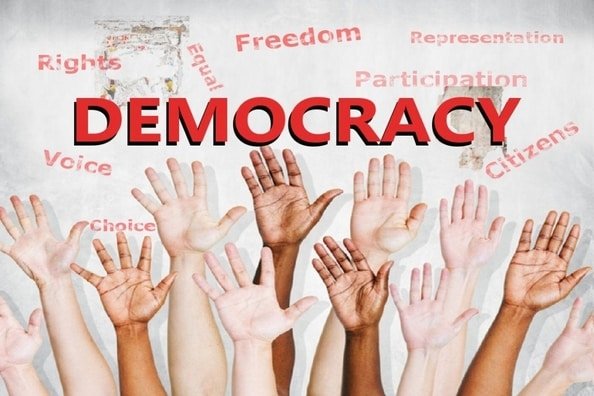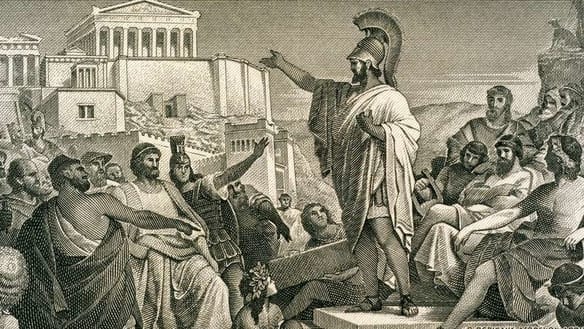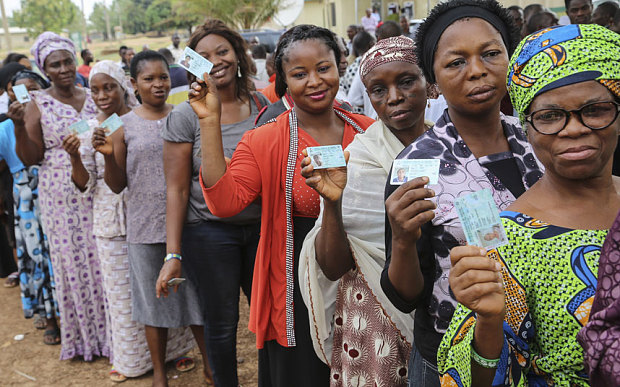Back to: CIVIC EDUCATION JSS2
Welcome to Class !!
We are eager to have you join us !!
In today’s Civic Education class, We will be discussing Democracy. We hope you enjoy the class!

Democracy
Democracy can be defined as a type of government in which people exercise their political power through the periodic election of leaders by them or their representatives.
Abraham Lincoln (the 16th American President) defined democracy as the government of the people, by the people, for the people.
Origin of Democracy
The word ‘Demo and kratia’ which form democracy simply mean people and government respectively.
Democracy as a form of government had its origin in certain cities of ancient Greece where the whole body of adult male formed the legislature. There was no separation of powers and all officials were fully responsible to the popular assembly which can act in executive, judicial and legislative matters.

Types of Democracy
- Direct Democracy: This refers to the system of government in which all the citizens gather at a particular place for the purpose of governing the country.
- Indirect or Representative Democracy: Here representatives are elected to represent their people in government and take care of their people’s interest in government.
Features of Democracy
The main features of democracy are:
- Rule of Law: The principles of rule of law are applied in democratic societies. There is equality before the law, the supremacy of the constitution and so on.
- Periodic Free and Fair Elections: Under democracy, elections are held from time to time to elect leaders. For instance, different elections have been held in Nigeria before and after the 1999 election.
- Fundamental Human Rights: Rights of citizens are promoted and guaranteed. The law frowns at human right abuse and punishes the offenders. In Nigeria, the Human Rights commission ensures that citizens enjoy their fundamental human rights.
- Freedom of the Press: Under democracy, the print and electronic media are allowed to write and express their opinions. They are allowed to constructively criticize government policies for the progress of the nation
- Tolerance of Opposition: In a truly democratic setting, oppositions are allowed. People are allowed to express their views about government policies without being intimidated or molested.
- Party System: Democracy allows the emergence of political parties which compete for power during elections. Nigeria, for instance, has many political parties which present candidates for various political offices during elections

Benefits of Democracy
The following are the benefits of democracy:
It Ensures Equal Opportunity for all Citizens: Democracy provides equal opportunity for all citizens in every area of life.
It Discourages Misuse of Power: Under democratic settings, powers are not concentrated in the hands of an individual. This helps in preventing the tendency to use power to oppress the citizens.
It Gives Opportunity for free Choice of Leaders: Democracy allows the electorate to choose whosoever they feel should be their leader, democracy does not allow anyone to be imposed on the citizens.
It Allows the Existence of Rule of Law: The rule of law operates in a democratic setting. The leaders rule according to the principles of the rule of law.
It Encourages Tolerance: Democracy allows the majority to have its say and the minority to have a say in the affairs of the society.
It Encourages Political Stability: Through voting, it is possible to peacefully change a bad or a non-performing government.
It Gives Legitimacy to Elect People: Legitimacy refers to the acceptance and recognition by the citizens of a country, the rights of leaders to govern. Democracy makes elected people to have the support of their followers since these people chose them.

Conditions Necessary fora Successful Operation of Democracy
- Free and Fair Elections: For democracy to survive in any society, elections must be void of rigging and other electoral malpractice.
- The supremacy of the Constitution: The leaders must rule according to the provisions of the constitution. Leaders must respect the constitution by obeying court injunctions.
- Existence of Oppositions: The ruling party must tolerate different opposition groups. They must listen to their constructive criticisms and Consider their advice.
- Good Governance: The ruling party must through its policies affect the life of the masses positively. The promises made to the electorates during campaigns must be fulfilled. The masses must see the sincerity in their leadership.
- Education and Public Enlightenment: The leaders must constantly educate the masses on its programmes and policies; this helps the government to secure full participation or support of the people in the successful implementation of its programmes.
- Rule of Law: The country should be ruled on the basis of the principles of the rule of law.
- Independence of Judiciary: The legislature and executive should not interfere in the activities of the judiciary so that it can function as expected.
We have come to the end of this class. We do hope you enjoyed the class?
Should you have any further question, feel free to ask in the comment section below and trust us to respond as soon as possible.
In our next class, we will be talking about Democracy Institutions. We are very much eager to meet you there.

good